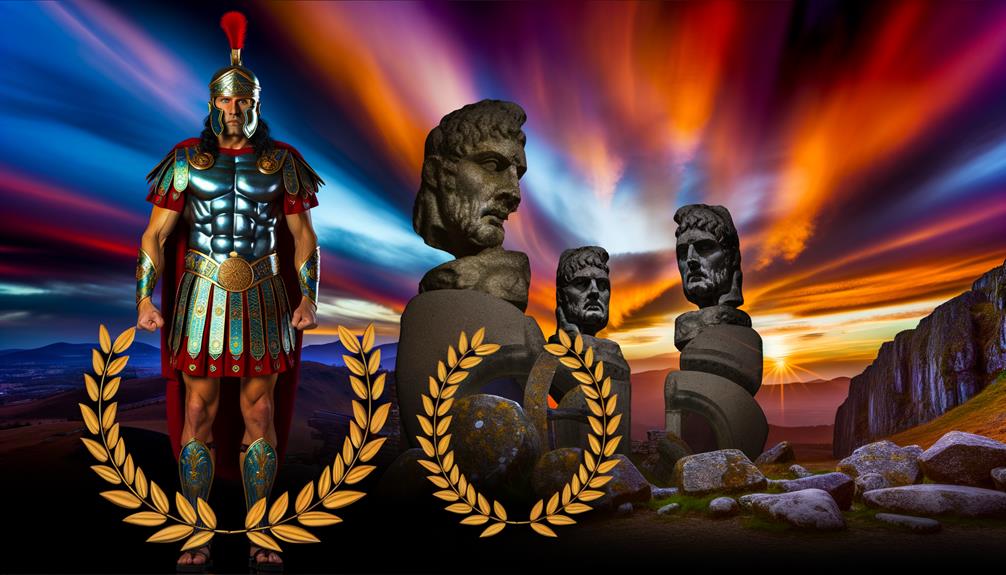Meaning of the Name Maximus
The name Maximus, originating from the Latin term for 'greatest,' signifies a legacy of grandeur and excellence. It was historically used to denote individuals of significant stature in Roman culture.
Prominent figures such as Saint Maximus the Confessor and Maximus of Ephesus have contributed to its enduring cultural and religious significance. The name also resonates in literature and media, often symbolizing strength and virtue.
Its modern appeal is sustained by contemporary parents who favor names exuding historical gravitas and resilience. If you wish to uncover the multifaceted impact of the name Maximus, there is much to explore.

Key Takeaways
- Maximus is derived from Latin, meaning 'greatest' or 'largest.'
- The name signifies individuals of significant stature and greatness in ancient Roman culture.
- It reflects societal values that celebrate excellence, grandeur, and superiority.
- Maximus holds religious significance, particularly in Christianity, symbolizing moral fortitude and ecclesiastical heritage.
- Modern appeal stems from its connotations of strength, virtue, and timelessness, popularized by figures in media and literature.
Origin and Etymology
Derived from the Latin word 'maximus,' meaning 'greatest' or 'largest,' the name Maximus has its roots deeply embedded in ancient Roman culture and language. This nomenclature was often used to signify individuals of significant stature or greatness, both in physical and metaphorical terms.
The etymology reflects societal values that esteemed magnanimity and superiority. The prefix 'max-' denotes an emphasis on the utmost degree, reinforcing the notion of preeminence. In Roman nomenclature, it was not merely a name but a title of honor and distinction. Its linguistic construction aligns with other superlative forms in Latin, such as 'optimus' and 'magnus,' which similarly celebrate excellence and grandeur.
The enduring legacy of the name underscores its historical and cultural significance.
Historical Figures Named Maximus
Throughout history, numerous eminent individuals named Maximus have left indelible marks on various fields, ranging from religious leadership to military prowess and philosophical thought. These figures have greatly contributed to the cultural and intellectual heritage of their respective eras.
Among them, three notable Maximus figures stand out:
- Maximus the Confessor: An influential Christian monk and theologian of the 7th century, known for his profound writings on asceticism and Christology.
- Maximus of Ephesus: A prominent Neoplatonist philosopher in the 4th century, who played a critical role in the revival of paganism during the late Roman Empire.
- Saint Maximus of Turin: A distinguished bishop and ecclesiastical writer of the early 5th century, recognized for his sermons and theological treatises.
These individuals exemplify the enduring legacy of the name Maximus.
Maximus in Literature and Media
As the historical figures named Maximus have showcased the profound impact of this name, its influence extends into literature and media, where it continues to evoke themes of strength, virtue, and leadership.
In Ridley Scott's film 'Gladiator,' the protagonist Maximus Decimus Meridius epitomizes the valorous warrior archetype, embodying honor and resilience.
Similarly, in various literary works, characters named Maximus often symbolize moral fortitude and strategic acumen. This name's profound resonance has been instrumental in shaping narratives that underscore the quintessential hero's journey.
Religious and Spiritual Significance
The name Maximus holds considerable religious and spiritual significance, particularly within Christianity, where Saint Maximus the Confessor is venerated for his theological contributions and steadfast faith.
In Catholicism, the name Maximus symbolizes greatness and moral fortitude, echoing the virtues exemplified by historical religious figures who bore the name.
These historical influences have cemented Maximus as a name imbued with deep spiritual resonance and ecclesiastical heritage.
Christian Saint Maximus
Revered as a prominent figure in early Christianity, Saint Maximus is celebrated for his profound theological contributions and unwavering commitment to the faith. His legacy is marked by his deep engagement with Christological debates, most notably his defense of the doctrine of Dyothelitism, which asserts that Christ has two wills, divine and human.
Maximus's theological rigor and intellectual resilience were instrumental in shaping orthodox Christian doctrine. His defense of Dyothelitism was pivotal during the Monothelite controversy. Maximus's works include critical treatises and letters that continue to be studied for their theological depth. He endured persecution and exile, demonstrating his steadfast dedication to orthodoxy.
Saint Maximus's life and works remain influential in theological studies and ecclesiastical tradition.
Symbolism in Catholicism
Building upon the theological foundations laid by figures like Saint Maximus, the rich tapestry of symbolism in Catholicism serves to communicate complex religious and spiritual truths through tangible forms.
Symbols such as the crucifix, the Eucharist, and the Sacred Heart encapsulate profound theological concepts, embodying the intersection of the divine and the material.
The use of symbols transcends mere representation, engaging the faithful in a deeper contemplation of divine mysteries. The crucifix, for example, not only represents Christ's sacrifice but also invites reflection on themes of redemption and salvation.
Similarly, the Eucharist signifies Christ's real presence, fostering a sense of unity among believers. These symbols offer a conduit for spiritual connection, enriching the Catholic faith's doctrinal and experiential dimensions.
Historical Religious Influence
Throughout history, the name Maximus has held substantial religious and spiritual weight, often symbolizing strength, righteousness, and profound theological insight within various religious traditions.
In early Christianity, Saint Maximus the Confessor was revered for his theological contributions and steadfast faith during persecution. His works greatly influenced Orthodox Christian thought.
Additionally, Maximus of Turin, an early bishop, played a crucial role in shaping Western Christian doctrine.
The name Maximus also appears in hagiographies, where its bearers are depicted as paragons of virtue and moral fortitude.
Popularity Trends Over Time
The name Maximus has experienced notable fluctuations in popularity throughout different historical periods, often influenced by cultural and societal shifts.
Analyzing these trends reveals significant regional variations, with certain geographic areas demonstrating a higher propensity for the name's adoption.
Understanding these patterns not only provides insights into the historical context but also highlights the cultural factors that contribute to naming preferences over time.
Historical Popularity Shifts
Analyzing the historical popularity trends of the name Maximus reveals significant fluctuations influenced by cultural, social, and historical contexts. During the Roman era, Maximus was a prevalent choice, symbolizing greatness and power. The name's prominence waned during the Middle Ages, reflecting shifting societal norms and diminished Roman influence.
In modern times, the resurgence of Maximus can be attributed to various factors:
- Media Influence: Popular films and television series have revived interest in classical names.
- Cultural Renaissance: A renewed fascination with ancient cultures and their legacies.
- Celebrity Endorsement: Prominent public figures choosing the name for their offspring.
These elements collectively illustrate how Maximus's popularity has ebbed and flowed, corresponding with broader cultural and historical dynamics.
Regional Naming Trends
Examining regional naming trends reveals distinct patterns in the popularity of the name Maximus, influenced by local cultural, linguistic, and social factors. Significantly, the name Maximus enjoys varying degrees of acceptance across different regions. For instance, in Latin-speaking countries, the name resonates with classical roots, enhancing its appeal. Conversely, in regions with less historical connection to Roman culture, the name is perceived as unique and modern.
| Region | Popularity Trend |
|---|---|
| North America | Increasing, favored in urban areas |
| Western Europe | Steadily popular, classical influence |
| Latin America | Highly popular, cultural resonance |
| Asia | Emerging, seen as exotic |
| Africa | Limited use, gradually rising |
These trends highlight the complex interplay between historical legacy and contemporary naming practices.
Modern Appeal and Usage
In contemporary society, the name Maximus enjoys a notable resurgence in popularity, reflecting a broader cultural trend towards classical and historically rich names. This revitalization can be attributed to several factors:
- Pop Culture Influence: Characters in films and literature, such as Maximus Decimus Meridius in 'Gladiator', have reinvigorated interest.
- Modern Naming Preferences: Parents increasingly favor names that convey strength, grandeur, and timelessness.
- Globalization: The ease of cross-cultural exchange has facilitated a broader acceptance and admiration for names with ancient origins.
The name Maximus, with its connotations of greatness and authority, appeals to contemporary sensibilities by bridging historical gravitas with modern aspirations. This duality guarantees its continued relevance and esteemed status among new generations.
Conclusion
The name Maximus, like a timeless monument, stands as a tribute to grandeur and significance across various domains. Its etymological roots in Latin, historical prominence among notable figures, frequent appearances in literature and media, and religious connotations underscore its enduring appeal.
Popularity trends reveal fluctuating yet persistent admiration, while modern usage reflects a continued fascination. The name Maximus, hence, embodies a rich tapestry of cultural, historical, and spiritual dimensions that remain relevant through the ages.






